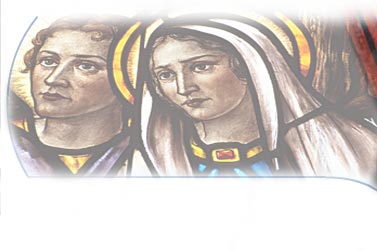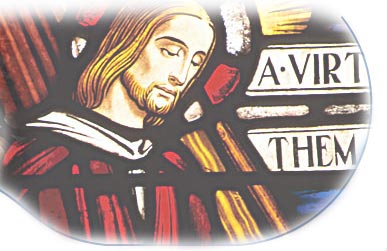Funerals
Frequently Asked Questions about Funerals
1. We do not regularly attend a Parish in the area, and we cannot find a Priest who will preside at the funeral of our loved one. It is very important for us that our deceased receive all of the benefits of the Church, and be given a holy burial. What can we do?
There are several options that are open to you. Most Roman Catholic parishes will require that your deceased friend or relative have had at least some connection to them before their death. Some parishes will demand that the deceased have been a regular attendee at Mass, received the sacraments regularly, and most tragically have been a regular contributor to the Sunday collections. Even if your loved one does not meet those qualifications, and if you are open to doing so, seek out a parish where you feel comfortable, meet with the priest and explain that you would like to have your loved one buried from their church. You may even ask the funeral director to intercede with the priest, since they may have a working relationship with one another.
All Catholics who approach a Catholic priest for any sacrament, or help of any kind should be welcomed and listened to with kindness. If you do not feel that you are being welcomed or treated kindly by your local priest or parish, I assure you that I will treat you with kindness and acceptance – nonjudgmental.
2. We are not practicing Catholics, or our deceased loved one was not Catholic, will you do the funeral?
Your religious status, even that of your deceased, will not prevent me from assisting you in this tragic time. It is an act of mercy to bury the dead. Your loved one deserves a celebration of their life, and the prayers of all of God’s People as we commend them to His mercy and love.
3. How long does the typical ceremony last?
A funeral can run about 15-90 minutes, depending on the kind of rituals being celebrated, or how you wish to personalize it. A funeral can involve a Vigil Service the night before the burial; a funeral Mass or Chapel service; and the rite of burial at the graveside. There is plenty of room for readings—Biblical and non-biblical—music. In addition, you may include people who are special to you in roles such as a reading, music, or giving a blessing or offering a short eulogy during the ceremony.
4. What is your stipend to officiate at the funeral, and what services does this include?
Ordinarily I receive $250 for a funeral. This stipend or honorarium is inclusive of: counseling survivors, all preparations for the ceremony, and officiating. These services may vary based on the needs and desires of the family or survivors.
5. What does it mean to 'rent' you to officiate at the funeral?
Despite the name of the CITI Webpage (rentapriest.com), Roman Catholic priests are not for rent. The stipend is merely intended to compensate for the time that I spend away from my family, and to defray from the expenses I incur in planning, preparing and celebrating funeral liturgies. Sacraments and sacramentals cannot be sold or bought. All of these are free gifts of grace established by Christ for the salvation and holiness of those who receive them. Jesus alone paid the price through His Suffering, Death and Resurrection. Nothing can ever truly compensate for the cost of ministry, other than the blessings it bestows on the people I work with.
I want to make this very clear, this is not a fee for services rendered. This may sound like a fine point, but this is very important. Above all else, this is the ministry that Christ gave to me at my ordination, and so it is not, nor will it ever be a business.
6. What if this is more than I can afford?
Since this is a ministry, and we are discussing a tragic loss of a loved one, as well as the funeral liturgy that will be offered for them, no person or family should ever feel that they cannot call me simply because of the cost. If the offering listed above is beyond your means please let me know, we’ll work something out. I will never turn you away because you cannot afford the 'customary' offering.
What is most important to me is that you have God’s blessing at this difficult time in your life and that you feel His love and peace in your hearts.
7. When do we pay you?
Unless we agree to another arrangement, the balance is due before the beginning of the funeral liturgy.
8. Where’s Christ in all of this?
The Gospels testify that Jesus is the Way, the Truth, and the Life; and no one comes to the Father except through Him. Our Lord proved through His Resurrection that death has no more power, and that all who come to Him have life everlasting! Jesus did not come to save the perfect, but to save sinners. Christ is our hope, the hope of the imperfect, for a life of peace and joy without end.
Catholicism is larger than the institution that has evolved around it. Catholicism is more than its corporate structure. It's more than the bishops – though we ought to respect them. It is more than the Pope, though he has claim on our loving attention. It is more than the Vatican. Popes, bishops, and priests may be the ones with legal title to the buildings, but they are just people. They can be woefully mistaken, or even malfeasant, as just a glance at recent headlines reminds us.
We are the Church -- you and I – we are the People of God. The Church is the Spirit of Christ within the community of believers who support and nurture one another through prayer, the sacraments, and charitable words and deeds. We seek to promote the growth of all people in holiness of life. It is our journey together – and on that journey each one of us has the right to feel welcomed at the Lord’s Table, where we recognize Him in the breaking of bread. Each person has a right to receive God’s blessing in great moments of happiness and sadness –at the loss of our loved ones, and at the hour of death. Everyone has a right to receive help on the journey from those called to be helpers and guides in the way of the Gospel. Isn't that what the priesthood is all about, being a wise and helpful guide on the journey of the soul to God?
When the hierarchy loses its way – as it has from time to time throughout history – it is incumbent on the rest of us to claim our rights and assume our responsibility as members of the Body of Christ. If you are alienated from the institutional church, you need not be alienated from your Catholicism. The Church – though not its current leaders – welcomes you just as you are. It welcomes you in your second marriages, it welcomes you if you are gay, and it welcomes you if you are burdened down with some unspeakable guilt or shame. It welcomes you in His name, the one who has never ceased loving you – not even during the times when you felt farthest from Him.





